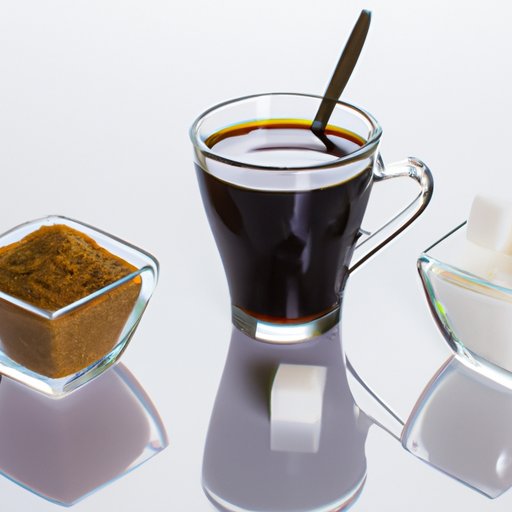
Introduction
Caffeine is a popular and widely consumed stimulant found in many beverages and foods. It has several potential benefits, including aiding in weight loss. In this article, we will explore how much caffeine per day is recommended for weight loss and how it can help us lose weight. We will also discuss the risks of consuming too much caffeine.
How Caffeine Can Aid in Weight Loss
Studies have shown that caffeine can boost metabolism, decrease appetite, and increase energy levels, all of which can contribute to weight loss. Caffeine stimulates the central nervous system and helps burn calories, which in turn helps burn fat. In addition, caffeine can also suppress the appetite and increase the feeling of fullness. However, it is important to note that these effects are temporary.
One study published in the American Journal of Clinical Nutrition found that caffeine can increase basal metabolic rate by up to 11% and fat burning by up to 29%. Another study published in the Journal of Clinical Endocrinology and Metabolism found that consuming caffeine 30 minutes before exercise can increase fat burning during exercise by up to 50%.
While caffeine can have many positive effects on weight loss, it is essential to be aware of the potential risks associated with consuming too much caffeine. These risks can include palpitations, anxiety, insomnia, and increased blood pressure among others. Therefore, it is essential to monitor caffeine intake and avoid excessive consumption.
Recommended Daily Caffeine Intake for Weight Loss
The ideal amount of caffeine per day for weight loss varies from person to person. However, it is recommended to consume between 200-400 milligrams of caffeine per day, which is roughly the amount found in two to four cups of coffee. While the amount of caffeine in tea is lower than coffee, it still contains caffeine. Thus, it is recommended to consume at most four cups of tea daily.
It is important to note that caffeine tolerance varies among people. If you are sensitive to caffeine, it may be advisable to stick to a lower amount to avoid potential negative side effects. Additionally, caffeine intake should be monitored throughout the day and changes made accordingly to avoid any potential adverse side effects.
Sources of Caffeine and Amounts
Many common sources of caffeine include coffee, tea, energy drinks, and soda. The amount of caffeine in these sources varies from one drink to another. For example, an 8-ounce cup of coffee contains between 80-100 milligrams of caffeine, while a 12-ounce can of soda contains around 40 milligrams of caffeine. In contrast, a cup of tea contains between 14-60 milligrams of caffeine.
While there are many sources of caffeine available, it is essential to consider the healthiest and safest ways to consume it. Drinking coffee or tea without adding sugar, creamer, or milk can be a healthier way of consuming caffeine. Additionally, it is important to avoid energy drinks that may contain excessive amounts of caffeine and sugar.
Effects of Caffeine on Different People
The amount of caffeine per day optimal for weight loss can be influenced by factors such as age, sex, weight, and lifestyle. For example, a 45-year-old male who weighs 220 pounds and exercises regularly can consume more caffeine than a 25-year-old female who weighs 120 pounds and does not exercise regularly.
It is also important to note that excessive caffeine intake can lead to negative side effects, such as anxiety, insomnia, palpitations, and increased blood pressure, among others. Therefore, it is essential to monitor caffeine intake and avoid excessive consumption.
Alternative Ways to Lose Weight without Caffeine
While caffeine can be beneficial for weight loss, there are many healthy alternatives to boost metabolism, reduce appetite, and increase energy levels. Exercise is an excellent way to increase metabolism and burn calories. Consuming a healthy and balanced diet can also help with weight loss. Additionally, getting enough sleep can help increase energy levels and improve overall health.
For individuals who are sensitive to the side effects of caffeine, there are several alternative sources. Green tea contains caffeine but in lower amounts than coffee. Dark chocolate also contains caffeine and has several health benefits. Finally, it is essential to note that medications and supplements containing caffeine should be avoided.
Conclusion
In conclusion, caffeine can be a useful tool for weight loss when used in moderation. It can help boost metabolism, decrease appetite, and increase energy levels, all of which can contribute to weight loss. However, it is essential to monitor caffeine intake and avoid excessive consumption. Additionally, there are several healthy alternatives to boost metabolism, reduce appetite, and increase energy levels for individuals who do not wish to consume caffeine.





